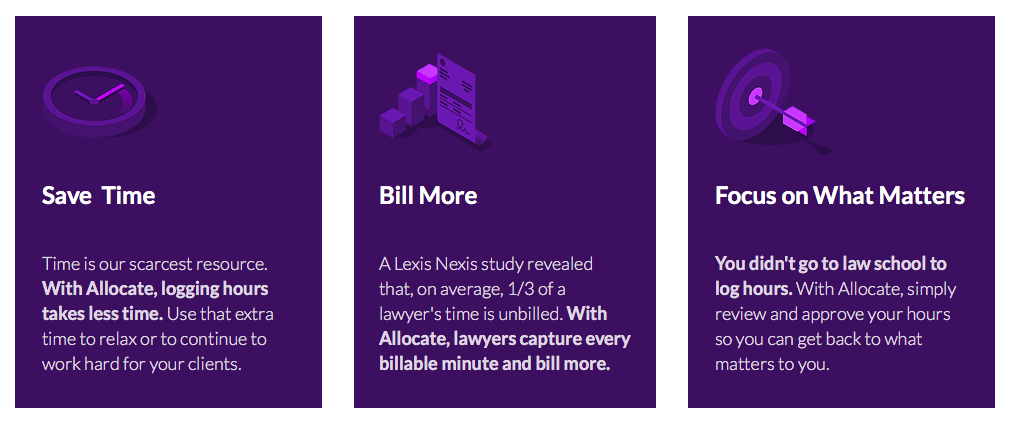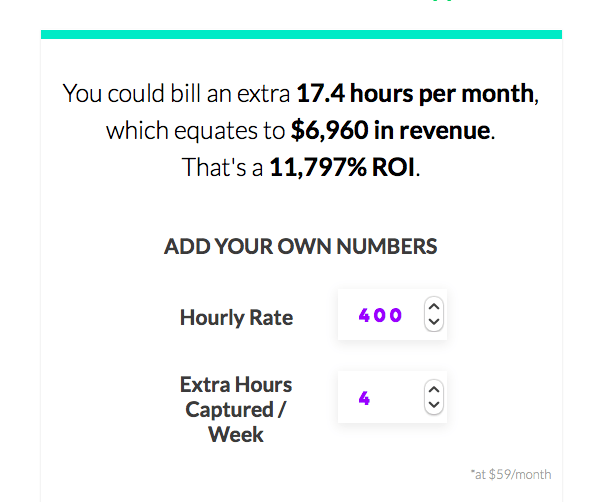
Allocate Legal, a San Francisco-based legal tech company, hopes to provide law firms with an additional 1.3 hours per fee earner as a result of improved time capture from using its machine learning platform.
Across an entire law firm, 1.3 hours additional billable time per day, per lawyer, would be a huge increase in revenue and profits. Sounds good, if a little ambitious…. Artificial Lawyer caught up with founder Erik Zahnlecker to hear some more.
Allocate is a couple of years old now, and Zahnlecker explains that they started out looking at other sectors, such as PR, but now the main focus is legal. This makes sense as of all the professions on the planet, lawyers are still the most wedded to the ‘time = money’ formula.
What Allocate does is similar to what a range of other companies are seeking to do in this space: improve data capture, which in turn will lead to lawyers not losing out on billable time, while also making the process of data organisation easier so lawyers don’t waste time on the ‘time admin’ either.
‘Basically we sync different data sources, your calendar, emails, and soon your phone, and then present back the data to you. The system starts to learn what things mean, depending on how you use the system and its sees what other things are related to certain matters or clients,’ he explains.
Zahnlecker adds that there is machine learning involved, which appears from the demo Artificial Lawyer saw to be largely developed in a supervised way from a lawyer interacting with the system, making it more intuitive.

‘We have an algorithm that groups things for users, it says things like ’these actions look related’. You can then easily just drag and drop items into your time card, then submit it into your case management system,’ he notes.
‘Using word embedding vectors and predictable models the system learns the patterns of a lawyer’s work,’ he explains. This helps to improve the categorisation of work, which in turn helps a lawyer to ensure that all those bits and pieces of human activity, such as sending and reading emails, making calls, going to meetings, don’t get missed out.
And in a world where you can be receiving dozens and dozens of emails a day, and trying to read and deal with them, with little time to log what you have done, if you can’t partially automate this time data capture then you may well lose it. This is because, quite simply, as a busy human, you’ll just forget all the details of what you have done and what is potentially billable.
Zahnlecker says they’ve been working closely with Clio, the cloud based case management software company which has a focus on small to medium-size law firms. They’ve now reached around 30 clients.
They’re also looking to integrate with a range of other case management systems, such as: Thomson Reuters Elite, Rocket Matter and Practice Panther.
But….will they succeed? There are a lot of other new companies now operating in the time/billing/cost segment of the legal tech market. There are also a raft of older incumbents whose tech may not be so fancy, but are well-established within many law firms across the market.
Zahnlecker responds that they have something up their sleeve: competitive pricing, selling the system at $49 per user, per month (or $59 if billed per month). The company states that given you could be generating several hours extra per week then the system pays for itself many times over. He also notes that there are around 1.3m lawyers in the US. If they can just win a small part of this market…..

Sounds compelling, so here’s a couple of thoughts. First, what an unusual industry the law is where the profitability of a business can improve by relatively huge increases by just doing better admin.
Second, what happens when everything moves to fixed fees? Such tech will still be useful for internal accounting purposes. And, despite everyone’s hope that the billable hour will soon be dead….it’s hanging in there like some sort of unkillable movie character.
And, a last thought: does this help the client? That’s an interesting one, as if the lawyers are not counting up all the billable time possible the client gets a smaller bill. Moreover, when the client gets the newly, data-correct bill, will they want to pay the larger amount? Won’t they push back?
Hmmm, there’s clearly more to this billing thing than meets the eye. But, as long as lawyers seek to sell their time, then improved systems such as Allocate will no doubt be seen as valuable additions to the practice software suite.